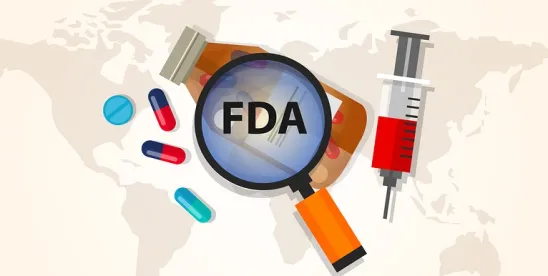Brand companies who own GLP-1 products have been pushing the Food and Drug Administration (FDA) to limit their compounding. On August 28, 2024, Eli Lilly and Company submitted a nomination to request that its GLP-1 product, tirzepatide, be added to FDA’s Demonstrable Difficulties for Compounding (DDC) lists. More recently, on October 22, 2024, Novo Nordisk, the creator of the Ozempic® (semaglutide) and Wegovy® (semaglutide) injections, nominated its semaglutide glucagon-like peptide 1 (GLP-1) medications to be listed. If FDA places these drugs on the DDC list, the drugs will not qualify for certain statutory exemptions under the Federal Food, Drug, and Cosmetic Act (FDCA) and, most importantly, the drugs will not be allowed to be compounded by pharmacists, physicians, or outsourcing facilities.
What are the DDC Lists? The DDC lists do not currently exist. FDA is statutorily mandated to create these lists and issued a Proposed Rule on March 20, 2024, with comments being due by June 18, 2024. FDA is proposing to establish criteria FDA will use in evaluating drug products or categories of drug products that present demonstrable difficulties for compounding under each section. The Proposed Rule has not yet been finalized.
What are the Proposed Rule’s Criteria for Inclusion on the DDC List? For evaluating drug products or categories of drug products for inclusion on the DDC list, FDA proposed to establish the following criteria:
- formulation complexity,
- drug delivery mechanism complexity,
- dosage form complexity,
- complexity of achieving or assessing bioavailability,
- compounding process complexity, and
- complexity of physicochemical or analytical testing of the drug product or category of drug products.
FDA proposes to consider these criteria and the risks and benefits to patients of the compounded drug product or category of drug products in determining whether to add the drug product or category of drug products to one or both lists.
How would the GLP-1 Drugs Fit the Proposed Rule’s DDC Criteria? In its submission to FDA, Eli Lilly and Company relied on these proposed criteria and claimed that tirzepatide, the active ingredient in Mounjaro® (tirzepatide) injection and Zepbound® (tirzepatide) injection, meets at least two of these proposed criteria—first because of the complexity of its formulation, and second because of the complexity in its required physiochemical or analytical testing. In its submission, Eli Lilly and Company cited multiple instances of adverse events associated with compounded tirzepatide and claimed such compounding introduces significant public health risks.
Under the Proposed Rule, FDA includes the following three categories of drug products to be included on the DDC Lists: (1) oral solid modified-release drug products that employ coated systems (MRCs), (2) liposome drug products (LDPs), and (3) drug products produced using hot melt extrusion (HMEs). Semaglutide liposomes, such as Ozempic and Wegovy, would likely fit under these proposed categories and be candidates for inclusion on the Proposed Rule’s DDC lists.
If Novo Nordisk and Eli Lilly and Company are successful in their submissions, semaglutide and tirzepatide products would be deemed too complex or too difficult to compound and would be deemed to pose safety risks to patients if compounded or manufactured incorrectly.
What’s Next
Inclusion on the DDC lists would limit Ozempic and Mounjaro (marketed for type 2 diabetes) and Wegovy and Zepbound (marketed for chronic weight management) from being compounded by pharmacists, physicians, and outsourcing facilities, even during any current or future shortages of these products.
Pharmacists, physicians, and outsourcing facilities will need to continue to remain flexible and respond quickly to new regulatory updates. During recent shortages, many FDA-licensed facilities sold compounded GLP-1 products. On October 2, 2024, however, FDA determined that the shortage of tirzepatide injection had been “resolved,” and compounders already have been required to adjust their practices to comply with FDA’s requirements for what can be legally compounded outside of a drug shortage. See our prior blog “GLP-1 Drugs: FDA Removes Lilly’s Zepbound® and Mounjaro® (tirzepatide injection) from its Drug Shortage List,” dated October 8, 2024.
We expect continued legal action from brand companies. Novo Nordisk previously challenged compounders by filing several lawsuits against wellness clinics and medical spas marketing compounded semaglutide in June 2023, resulting in a permanent injunction in February 2024. On the other hand, less than a week after FDA determined that the tirzepatide shortage had been resolved, the Outsourcing Facilities Association (OFA), a trade association representing FDA-registered 503B outsourcing facilities, filed a lawsuit against FDA relating to the agency’s removal of tirzepatide from the FDA’s drug shortage list. See our prior blog “GLP-1 Drugs: FDA Sued Over Removing Tirzepatide from the Drug Shortage List,” dated October 23, 2024. (Note that on November 19, 2024, the parties filed a joint status report in the case where FDA indicated it has not yet made a determination in its reconsideration of the status of tirzepatide and will provide another update to the court on December 19, 2024. During this period, FDA has stated it will not take enforcement action against compounders who continue to make tirzepatide products.)
While it is highly likely that FDA will not address either Novo Nordisk’s or Eli Lilly and Company’s submission until after the Proposed Rule is finalized, it is important that any entities compounding these drugs are aware that further changes to the rules may impact their ability to compound such drugs in the near future. We recommend consistent monitoring of new developments and guidance on this issue.







 />i
/>i

